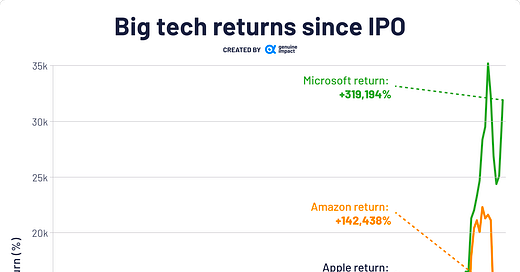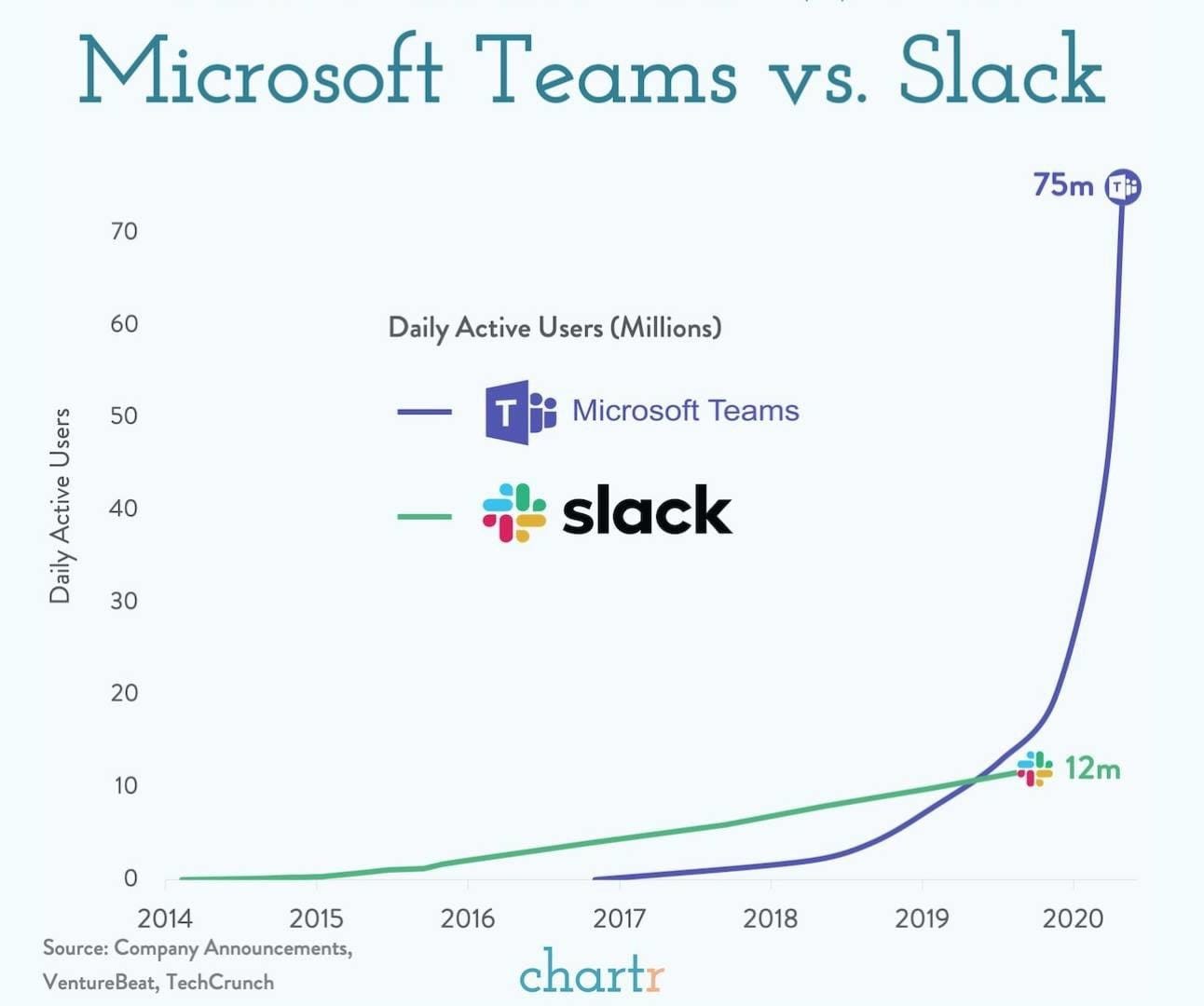Sunday Reads #188: How Microsoft became the world's most valuable company.
A two-step playbook to world dominance.
Hey there! (and to recent subscribers, welcome!)
Hope you’re having a great weekend.
If you missed last week’s newsletter, here it is: Do you know whom you're marketing to? Do you, really?.
This week, let’s talk about Microsoft. Once had the world at its feet. Then it was written off. Many times. And now it’s the world’s most valuable company.
1. Who said elephants can’t dance?
This week, Microsoft crossed Apple to become the most valuable company in the world.
Time to share this chart from May 2023:
Lesson: If you want to make Google's spectacular growth look like a flat line, add Microsoft to the graph.
Folks wrote so many obituaries of Microsoft during the 15+ years it took to retrace its 2000 peak.
And no one - absolutely no one - could have predicted the last few years of blistering growth.
Microsoft's secret is a simple (oh, but not easy at all!) two-step playbook:
Step 1: Create a proprietary platform for others to build on.
A lot of companies throw around the word "Platform".
"We are building a platform for D2C brands". "We are building the next-gen platform for apps to reach consumers". Etc.
As Bill Gates would say, "that's a crock of shit". Ben Thompson wrote about this in The Bill Gates Line, citing an interview with Chamath Palihapitiya:
Semil Shah: Do you see any similarities from your time at Facebook with Facebook platform and connect, and how Uber may supercharge their platform?
Chamath: Neither of them are platforms. They’re both kind of like these comical endeavors that do you as an Nth priority. I was in charge of Facebook Platform. We trumpeted it out like it was some hot shit big deal. And I remember when we raised money from Bill Gates, 3 or 4 months after — like our funding history was $5M, $83 M, $500M, and then $15B.
When that 15B happened a few months after Facebook Platform and Gates said something along the lines of:
“That’s a crock of shit. This isn’t a platform. A platform is when the economic value of everybody that uses it, exceeds the value of the company that creates it. Then it’s a platform.”
Read that again:
A platform is when the economic value of everybody that uses it, exceeds the value of the company that creates it. Then it’s a platform.”
With this definition of "Platform", you can see how few companies make the cut.
Facebook: Not a platform.
Google: Not a platform. It's just an aggregator.
Apple App Store: Not a platform. The cut it takes is TOO high.
But Windows? Well , that was well and truly a platform.
And by creating an environment for developers to succeed, Microsoft charted its initial success.
I wrote about this in What sweaty Steve Ballmer knows about startups that you don't:
Why does the gorilla win?
The gorilla wins because over time, it starts to define the industry standards. It becomes a platform that others build on top of.
A gorilla creates a network effect where none exists.
Developers build apps for Windows, or plugins for Shopify.
Entire consulting firms exist only to help companies install Salesforce.
System Integrators help companies set up Cisco networking infra.
Once you've embedded yourself into an ecosystem, it becomes impossible for a competitor to dislodge you.
And the more you sell to that ecosystem, the better (and lower cost) your products become. Your competitors fall further and further behind.
And because you're the de facto standard now, all competitors are measured against you. And they fall short.
And then you win.
Next time someone tells you they're building a "platform", ask them for their version of the Ballmer "Developers, Developers" chant:
Now, what do you do after this initial success?
Answer: You start expanding.
Step 2: Kickstart the Product to Distribution flywheel.
Once you've done the hard part of firmly lodging yourself into your customers' world, then you start reaping the dividends.
How? By selling them more products.
By plonking more products down the distribution funnel you've so painstakingly built.
I wrote about this in How Microsoft became a multi-trillion dollar company:
We've all seen this graph of the meteoric rise of Microsoft Teams.
And we've all dismissed it with disdain. "Yeah, they're dumping a Teams account on every Office user without their knowledge."
But what if I told you this is not one-off? That this is not a flash in the pan? That Microsoft keeps doing this?
Microsoft Azure is a great example. Amazon’s AWS was the fastest company to USD 10B in revenue. And Azure grew faster than that. Faster than Amazon!
What, is Microsoft now bundling free servers with Office??
No, it isn't. It has another trick up its sleeve. Well, it's a trick, but it's not exactly a secret. It's been the standard strategy of big companies over the last several decades.
The "Product to Distribution" Playbook.
In a 2018 interview, Marc Andreessen explained the playbook for big tech companies (BigCos):
The general model for successful tech companies, contrary to myth and legend, is that they become distribution-centric rather than product-centric.
They become a distribution channel, so they can get to the world. And then they put many new products through that distribution channel.
…
See this "Product to Distribution" approach once, and you start seeing it everywhere.
Microsoft is the OG of this approach, of course. Word, PowerPoint, Excel, Internet Explorer, ... It keeps building / buying new products, and dropping them down the giant Windows distribution chute.
And this approach has increasing returns over time, if MSFT’s market cap is any indication.
With Microsoft's unique and deep inroads into companies, its B2B distribution is unbeatable. Expect it to win big with AI in the workplace as well.
Further reading on Microsoft:
Microsoft's moves in AI have been a masterclass in strategy. I wrote about it in An epic dance-off between two trillion dollar companies.
Microsoft may be a multi-trillion dollar elephant, but it sure can dance!
Before we continue, a quick note:
Did a friend forward you this email?
Hi, I’m Jitha. Every Sunday I share ONE key learning from my work in business development and with startups; and ONE (or more) golden nuggets. Subscribe (if you haven’t) and join 1,600+ others who read my newsletter every week (its free!) 👇
2. Golden Nugget of the Week.
Seth Godin has a wonderful post, Working with Problems:
First, is it a problem or a situation? Problems, by definition, have solutions. You might not like the cost of the solution, the trade-offs it leads to, or the time and effort it takes, but problems have solutions.
On the other hand, situations don’t. Situations are simply things we need to live with.
Once we realize that a problem we have isn’t a problem at all, but actually a situation, it’s easier to do our best to move on and thrive. Focusing on a situation is usually a source of stress, not a way forward.
Second, has anyone else ever solved a problem like this one in a useful way? If not, it might be a situation. See question one.
Third, if the problem has been around for a while, it might not be an *easy* problem. Those tend to get solved right away. It’s probably a problem that involves more effort or trade-offs than you were hoping for. Resetting our expectations for what it might take to solve gives us the chance to recalibrate it as a situation we’re willing to live with, simply because the cost of the solution is too high.
And finally, some problems get better if we’re willing to talk about them. Some situations, on the other hand, simply get worse when we focus our energy and community on them.
It's a good question to ask: Is this a problem, or a situation? Can I solve it, or do I need to adapt to it?
Reminds me of what Shaan Puri said when he lost $500K on crypto in 2021:
Is this a crisis, or an event?
3. Lemons, lemons, everywhere.
I read this angry rant on Hacker News the other day.
The Internet is full of AI Dogshit:
The Internet used to be so simple to use that people collectively coined the term “let me Google that for you” to make fun of people who had the audacity of asking other people questions online. In the future I fear that people will have no other choice but to ask people for information from the Internet, because right now it’s all full of AI dogshit.
In September of this year, Google users discovered that the search engine was incorrectly telling people that eggs can melt. Why? Because instead of surfacing websites, Google now grabs snapshots of pages in a drop down menu, allowing users to read search results without clicking on anything. This practice often grabs incorrect information, like an AI-generated answer from Quora that insisted that eggs can melt when they definitely cannot.
The internet has been broken in a fundamental way. It is no longer a repository of people communicating with people; increasingly, it is just a series of machines communicating with machines.
As I wrote in Lemon markets, dark forests, and a firehose of malicious garbage:
One thing I’ve been saying often is: when it's 10x easier to fake it than to make it, fakes will always outnumber the truth.
We saw it in the crypto summer of 2021, when all you needed was to create a token and you'd get mass adoption. A paper found that 98% of tokens launched on Uniswap were scams.
The general principle is:
When it's easy to showcase a veneer of "work" without doing the work itself, then 99% of the work you see will not be real.
When it's easy to generate content without writing it yourself, then 99% of content will be AI-generated.
And if 99% of content is AI-generated, you're better off assuming that 100% is AI-generated.
When you see any content online, the default assumption will be: this has been written by an AI.
This won’t happen tomorrow. It might not happen for the next three years. But inevitably, it will happen.
The Internet will become "a market for lemons".
…
As instant "fake content" becomes more and more like "real content" that takes hours to painstakingly produce, the outcome is clear:
The Internet will become, slowly and then suddenly, completely fake.
Guess I was wrong about the “slowly” part. This is already happening!🤦♂️
4. Moral dilemmas without the dilemma are my new favorite thing 🤣.
That’s it for this week. Hope you enjoyed it.
As always, stay safe, healthy and sane, wherever you are.
I’ll see you next week.
Jitha
[A quick request - if you liked today’s newsletter, I’d appreciate it very much if you could forward it to one other person who might find it useful 🙏].







